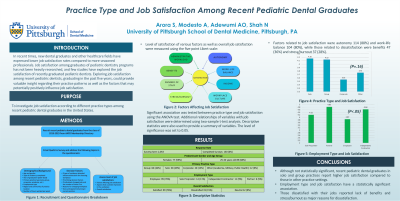Practice Management
236 - Practice Type and Job Satisfaction Among Recent Pediatric Dental Graduates


Snigdha Arora, DMD, MBA
Pediatric Dental Resident
University of Pittsburgh, Pittsburgh, PA
University of Pittsburgh School of Dental Medicine
Pittsburgh, Pennsylvania, United States- AA
Abimbola Adewumi, BDS FDSRCS(Eng) MClin Dent MPed Dent RCS(Eng)
University of Pittsburgh School of Dental Medicine
- AM
Adriana Modesto Gomes Da Silva, DDS, DMD, MS, PhD
University of Pittsburgh School of Dental Medicine
- AM
Adriana Modesto Gomes Da Silva, DDS,DMD,Ph.D
Professor
University of Pittsburgh School Of Dental Medicine
University of Pittsburgh School of Dental Medicine
Pittsburgh, Pennsylvania, United States - AA
Abimbola Adewumi, BDS, FDSRCS (Eng), MClin Dent, MPed Dent RCS(Eng)
Chair
University of Pittsburgh School of Dental Medicine
Pittsburgh, Pennsylvania, United States
Presenting Author(s)
Co-Author(s)
Research Mentor(s)
Program Director(s)
Purpose: This study investigated job satisfaction according to different practice types among recent pediatric dental graduates in the United States.
Methods: Participants were recent pediatric dental graduates from the past five years (2019-2023), recruited from the AAPD membership directory, and were sent an email survey that asked about demographic information, practice type, residency type, factors affecting job satisfaction, and overall job satisfaction.
Results: The survey was sent to 2,053 graduates with 130 (6%) responding. Majority 77 (59%) identified as female and 89 (68%) were 25-34 years old. Regarding primary practice types, 60 (46%) worked in a group practice, 38 (29%) solo, 20 (15%) corporate, and 12 (9%) included academia, military, and public health. Ninety-nine participants (76%) were satisfied, 19 (15%) were dissatisfied, and 12 (9%) were neutral about their current job position.
Practice type did not correlate with job satisfaction (P=.16) based on ANOVA test. Pediatric dentists working in group practice and solo practices showed similar and slightly higher mean satisfaction scores (4.1 and 4.2, respectively) compared to those in corporate (3.6) and other practice settings (3.7). The relationship between employment type and job satisfaction was statistically significant ( <.05). Factors related to job satisfaction were autonomy 114 (88%) and work-life balance 104 (80%), while participants were mostly dissatisfied with lack of benefits 47 (36%) and stress/burnout 37 (28%).
Conclusion: Recent pediatric dental graduates in group and solo practices reported high job satisfaction compared to those in other practice settings. Those dissatisfied with their jobs reported lack of benefits and stress/burnout as their reasons for dissatisfaction.
Identify Supporting Agency and Grant Number:
Research supported by the University of Pittsburgh School of Dental Medicine Department of Pediatric Dentistry

.jpg)